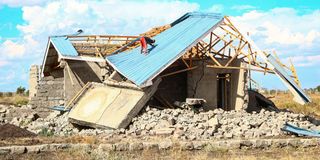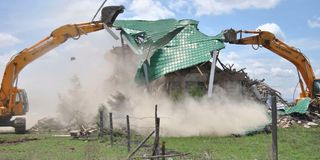
Due diligence starts with you. Have you done a physical visit to this property? Have you spoken to a neighbour within that location?
| ShutterstockDN2
Premium
Experts: This is why you should never rush due diligence in property transactions
What you need to know:
- Recent home demolitions are a sad reality for many. Experts are now asking; do we really understand the due diligence process? Why are we constantly falling victim to land fraud?
- DN2 Property sought clarity from the key experts in the land acquisition process on where we are going wrong, and they had interesting observations.
The month of October has been a painful one for thousands of households that lost their homes after demolitions in Mavoko.
But just before the dust settled, more households in Njiru received the shocker of their lives, after the Land and Environment Court ordered them to vacate by 31st December 2023 after it established the contested land legally belongs to the late Gerishon Kirima’s estate.
As if that was not enough, while speaking at an event at the Kenya Institute of Special Education, the president, hinted that there might be more evictions of settlers living on government land in Kasarani and Syokimau.
These events have been shocking to the masses, but they've also been a harsh reality check for those who own or intend to own property. They have also left experts questioning how we are conducting our due diligence as Kenyans.
Do we really understand the process? Why are we constantly falling victim to land fraud?
DN2 Property sought clarity from the key experts in the land acquisition process on where we are going wrong, and they had interesting observations.

A demolished house on the disputed Portland Cement land in Mavoko, Machakos County on October 18, 2023.
Different faces of land fraud
Christine Muthoga-Murithi, an Advocate at Muthoga and Omari Advocates observes that land fraud in Kenya is complex, and it takes many forms.
There are cases cutting across different government regimes still in court, then there are the usual fake title types of land fraud.
"We are also seeing identity theft cases. You find that someone owns property legally in their name, but a fraudster steals the owner's identity, by getting fake documents with the owner's actual details and assumes the owner's identity to sell the property.
It can be very difficult for buyers to detect this kind of fraud," says Christine. We also have other complicated cases of fraud where real estate companies and developers have the intention to sell property, but they misappropriate buyers' funds and when they end up cash-strapped they opt to disappear with people's money.
Rushed due diligence
When it comes to due diligence, Christine observes, a lot of Kenyans rush the process.
Sometimes they get in touch with advocates after they've already paid a deposit, which should never be the case.
Often, once you pay the deposit or booking fee before initiating the due diligence process, you face a lot of pressure from agents, brokers or sellers to start clearing your balance.
Fear of losing a "good deal" or the perfect property is also common among Kenyan buyers, as Christine notes.
And when this fear creeps in, even when the advocate advice a buyer to slow down, they do not listen.
Unfortunately, due diligence should not be rushed. "It takes time due to a number of reasons. For instance, it may take time to access certain records from the land's registry.
If it's an apartment, tracing some of the files requires movement from one office to another. Some developers are also reluctant in allowing conveyancing advocates to have a look at some of the documentation they need to see to ascertain the legitimacy of a project.
These could be various approvals or floor plans. Some feel as if sharing a copy of the title is enough and they should not be asked to share copies of other documents," explains Christine.
The other misconception Kenyans harbor around due diligence is that once you involve an advocate, you do not have to do anything else to ascertain the legitimacy of a deal.
"Due diligence actually starts with you. Have you done a physical visit to this property? Have you spoken to a neighbour within that location? Beyond the advocate and personal research on the property, you also have to engage a surveyor, who is a critical professional in land acquisitions".
Challenging industry
The nature of the industry also presents some unique challenges to professionals who assist in conveyancing.
For instance, Christine explains that recent decisions by the Supreme Court places a tough responsibility on advocates to not only conduct a simple official search, but also look into the complete history of a property.
This means going as far back as the first ownership record and/or the first allocation to establish whether it was done properly before looking into the sequence of transfers.
While all this is in everyone's best interest, there are challenges that come with this responsibility. "In most cases, people buying property are not willing to pay for the kind of money required to conduct all this research.

Aerial view of Njiiru land that court declared belongs to the family of late Gerishon Kirima.
Second, there is also resistance from custodians of these records at the registry, perhaps it's a data protection mechanism as it can be difficult to convince them that looking into these records is required by law.
Though an extensive green card search is considered more reliable, the majority of registrars will decline sharing a property's history at first, as they believe a simple official search is sufficient, "Legal and professional fees are also a concern for many.”
People save up for years to buy property and many of them take short cuts to avoid spending extra coins on the things associated with due diligence. Even when people have paid the professional fees and done relevant research, walking away from a bad deal is a tough decision, even after they are advised to do so, as Christine notes.
Perhaps, when they consider all the time, money and emotions they've invested in the property, they prefer to take the risk.
The transition from manual to digital registry has also presented challenges, despite the benefits. "I believe in the Ardhi Sasa platform. I foresee a future where court cases involving land fraud will reduce significantly in the future.
The system has locked out fraudsters and brokers who complicate the land buying process. However, you can never introduce anything new without experiencing problems, but over time, some of the issues have been resolved.
The Law Society of Kenya has worked hard to air our grievances and things are settling. The transition, was definitely a challenge for older lawyers who were used to a manual way of doing things.”
Red flags
Moving on to the actual due diligence, Muthoga shares a few red flags we need to watch out for. "When buying land that belonged to someone's deceased parent and the seller tells you that they do not have money to go through with the succession, but once you buy the land or a piece of it, they will divide your parcel and give it to you, just walk away.
In short, avoid land transactions where the paperwork is not in order”. In such a case, if you are conned, the courts have nothing to enforce.
If you are being rushed to buy a property, treat it as a red flag as well, though once in a while, there are legitimate reasons for such pressure.
Another case is where big developments, or real estate companies initiate the land acquisition process, but they start selling before they finish paying for it. It is a big red flag. "Everyone says the sooner you buy, the cheaper it is and that if you wait, the property prices will increase and you'll miss out, but what people do not realize is they're not risking missing out on a good deal, they are risking the money they already have."
Legal jargon
When conducting a search or researching a location, there are certain legal terms everyone needs to familiarize themselves with. For instance, caveat emptor means "buyer beware".
Caveat emptors could be in the form of newspaper announcements, billboards cautioning the public from buying a particular property or engaging in a transaction with a particular person.
A “caveat emptor” is, however, different from a “caveat”. A caveat is whereby one is asking the lands registrar to note on someone’s title that there is an issue of a certain nature.
It could be an ownership tussle or fears that something is going to happen, hence an interested party puts the registrar on notice to prevent transactions or transfers from taking place.
If the registrar notes that there are reasonable grounds, then they are supposed to register a caveat and notify the registered owner that a caveat has been registered against their property. Owners cannot register caveats, but they can register restrictions on their properties.
An “encumbrance” could be any form of restriction or limitation on how a property can be used. They could be permanent or temporary.
For instance, if the government intends to put a sewer line on your property, there could be an encumbrance on it.
A “charge” is a form of encumbrance, but it specifically means the property has been used as security in a bank loan, hence it cannot be sold. Once the loan is paid off, the property is “discharged”, and the encumbrance is lifted.
Surveyor’s role
Another critical expert to engage in land transactions is a Land Surveyor. Matthews Kaburu, a Land Surveyor and Director at Sphere Mappers says, a surveyor has several roles in land acquisition. First, they help in ascertaining the measurements and other land features to determine the depth and shape of a parcel, based coordinates. "If you miss one coordinate you might end up on the wrong parcel of land, which leads to costly legal problems," he cautions adding when you are invited to buy land, you might not understand its shape.
If you are not careful you end up with something very undesirable that is difficult to develop in the future. A surveyor may also assist in establishing a title’s authenticity by going through available land records.
Additionally, they prepare maps and reports for clients. Other tasks include, measuring and verifying boundaries, gathering data for civil engineering in case of construction in the future, preparing survey documents for registration and issuance of title deeds in accordance with the land act and land registration act.
They assist with land subdivisions or amalgamations (where you need to combine two parcels) and wayleave services among others.
Despite their important contribution in land transactions, Kaburu notes, just like with the advocates, some Kenyans avoid working with them due to fear of incurring cost.
In addition, people lack information on why they need to work with surveyors, and some are just ignorant.
A surveyor's fee may range from as low as 3,000 to hundreds of thousands depending on the land's location, type and services involved.
For instance, the processes involved in succession are not the same as those in the purchase of a small piece of land because the work involved is not the same.
There are several other components involved in costing such as the prices of maps, searches and mutations which the buyer shoulders.

November 2011 demolitions in Syokimau estate near The Jomo Kenyatta International Airport which rendered families homeless.
Unique challenges
Just like the advocates, surveyors experience challenges that buyers may not be aware of. The weather, for example, can make it difficult to go out and survey property. "You can't go out with tools when it is raining, but some clients are not very understanding when such delays occur," says Kaburu.
When the due diligence process is rushed, there are risks. If a surveyor makes an error, disputes might occur in the future- Kaburu notes that sometimes people fight over centimeters of land- and that is why surveyors need to take their time and be thorough.
Unfair competition is also a major challenge in the profession where surveyors undercharge to win more clients. He, however, cautions that cheap is expensive. There are things that need to be considered, like transportation and logistics, especially with increased fuel prices.
When selecting surveyors, he advices Kenyans to avoid dwelling too much on the professional fees. "Ensure they have an office where you can find them physically in case you need to follow-up on something and confirm that you've opened a file with them.
Most importantly, no one should rush you to make a decision to work with them."
Deadly Disputes
Disputes on boundaries or internal family issues may also make it difficult for surveyors to do their work.
"A surveyor can easily be attacked by those opposing a sale- this is why we need a reconnaissance visit to check the mood and feel first before commencing with the actual work."
With technological advancements now more people are requesting soft copies of their records, maps and paperwork and this is leaving out the older, yet experienced surveyors.
Lastly, Kaburu points out it is not uncommon for property owners to forget where the beacons are. Given that land changes with development, it can be challenging working on such parcels.
Kaburu says there are a number of other things that are important.
First, when you buy a map, ensure you understand your land's components and other close by features such as size of the closest road and whether it is likely to expand.
This is all part of due diligence because sometimes locations are marked for major developments, and this will affect your land values and what you can do with your investment. There are also several red flags to pay attention to.
"When someone tries to sell you a parcel on a large open space with no development, be wary. A reasonable investment should have some development or activity around it."
Kaburu also echoes Christine views on rushed transactions. "If a seller wants you to buy now or is selling property secretly without the knowledge of other family members, take time to understand the reasons first before committing yourself.
If possible, avoid giving them false hope."
You might also want to look into restrictions on land. Some areas are strictly marked as high, low or medium density. Also take time to look into the area's zoning.
"What is ear-marked for markets, industrial parks, shopping centres, social halls and playing fields among others. Even when this is not captured on the map- there is physical planning under special records held by the county" accessing such records will help you plan for your land.
Squatters' Rights
According to the land Act, section 152 A, it is illegal to occupy private, community or public land unlawfully. Even then, there are legal procedures to be followed when evicting someone or groups of people as captured in different sections of the Land Act.
- When the squatters are on public land, the affected people should be given a written notice which is published in the Gazette and in one newspaper with Nationwide circulation, plus a radio announcement in a local language where necessary, at least three months before the eviction.
- When community land is involved, the ultimate decision to evict rests with the County Executive Committee Member (CECM) in charge of land matters. Similar conditions on notifying the affected people apply, except that the notice does not have to be published in the Gazette.
- In the case of private land, there are several conditions to be met before eviction. First, the owner should serve a written notice of eviction in a national language three months prior. If a large group is involved, the notice should be published in at least two daily newspapers with nationwide circulation. The notice should also specify any conditions of eviction like demolition or clearing of crops and should be displayed in five strategic positions within the land in question.
- The private owner should also serve the Deputy County Commissioner in charge of the location and the Police Commanding Officer with the notice.· Section 152F notes that people affected by an eviction notice may apply for relief through the court.
- It is highly advisable to further read the Land Act to familiarize oneself with laws relating to evictions and other land matters.
- If you bought land following all due process, and it turns out there was foul play then you are entitled to compensation, and you can hold the registrar of lands involved accountable through the usual justice system. You may also pursue the individual or company that sold you the property legally. Reporting cases is highly advisable as it holds fraudsters accountable and contributes to ending the vicious cycle of land fraud in Kenya.





